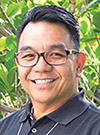Brotherhood is right for me
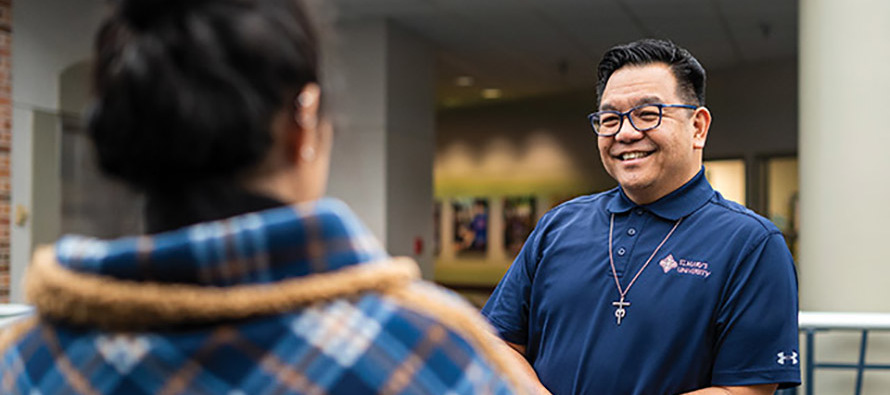
Brother Allen A. Pacquing, S.M. chats with a student at St. Mary’s University in San Antonio, Texas, where he works alongside other Marianist brothers. (Photo: Darren Shiverdecker, St. Mary’s University)
WHY DO YOU WANT to be a brother? What is a brother? When will you be ordained? Many people have asked me these questions, especially around the time of my final vows. I usually welcome them with a smile as an opportunity to share about myself and my calling. The vocation of a brother remains a mystery to many, and it really shouldn’t be. A religious brother’s vocation is part of the fabric of the church—meant to be interwoven with all the threads that make up the church. As brothers we use the gifts God has given us to bring everyone closer to Christ. A friend and mentor, Father William Kunisch, a diocesan priest from Honolulu, puts it simply: “Being a brother is a privileged way of following Jesus.” But how exactly did I end up a brother?
Family gave me my start
I was born and raised in Honolulu in a hardworking, tight-knit Catholic family. My parents immigrated from the Philippines in the mid-1960s, wanting my older sister and me to have the opportunity of the American dream. The values of faith, family, community, service, culture, language, and education were instilled in us. St. Anthony’s Church in Kalihi taught me the meaning of community long before I considered joining a religious community. We lived close by the church and school and couldn’t escape being drawn into the life of the parish, which was central for many of us in the neighborhood.
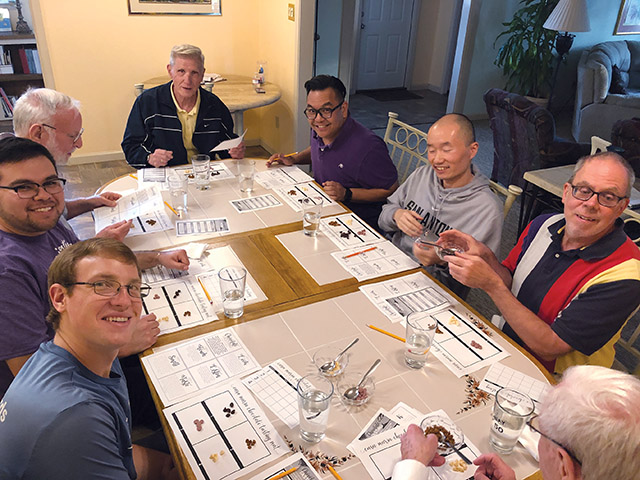
We were fortunate to have religious sisters, brothers, and priests who served our community. I was always in awe of them, not because of their habits (which seemed to remain miraculously clean at all times) but because of how they radiated joy. They were very much a part of us as teachers, preachers, presiders, and companions. They inspired me with their example of selfless service. Little did I know that those childhood experiences would lead me on a path to brotherhood, and, oh, what a journey it has been!
A community-minded professional
All parents want to see their children happy, healthy, and successful, and my parents were no exception. By building a family business in real estate, my parents were able to send us to Catholic school and help us with college. My goal as a young adult was to either embark on a career in criminal justice or take over the family business. I ended up doing some of both. I sold real estate part-time for the family business and worked my way up in the judiciary of the state of Hawaii.
I was achieving my professional dreams, but I always had the sense that something was missing in my life. A sense of yearning and searching would overtake me, and I couldn’t pinpoint what it was. Those feelings surfaced on occasion, then became more frequent. As I was pursuing my career, I continued to be an active, contributing member of the worship community wherever I lived. I volunteered in religious education and helped with youth and young adult ministry.
My life seemed to follow a healthy pattern: I was building a network of friends, vacationing, building my career, taking care of the family business, volunteering, having romantic relationships, etc. But again—there was something yearning in my heart—and finally I had to take it seriously.
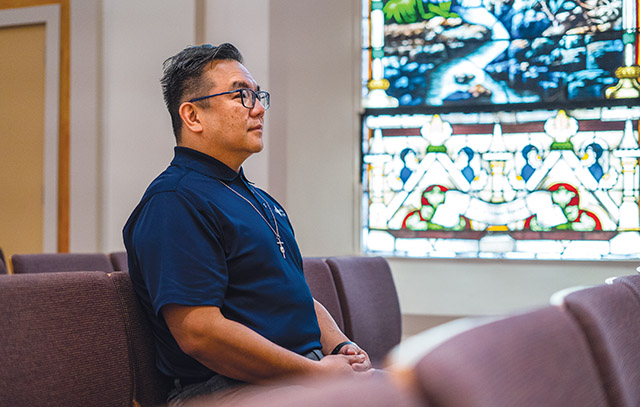
Am I crazy or what?
All my life I had been around priests, brothers, and sisters, so I had a fair understanding of the sacrifices they made to serve God and the church. I even had family members who belonged to religious orders. Yet never in my wildest dreams had I considered giving up my car, sharing my salary, asking for permission to do this or that, giving up on a spouse or family of my own. Not until someone directly asked me to consider it. When a friend suggested I should think about the possibility of life as a priest or brother, my first thoughts were: What, really? Do I look desperate? Does it seem like I can’t figure out my life and have to resort to a life in the church?
We religious brothers are men striving together to follow Christ as we serve the human needs of those around us. Whether enjoying our communal life or working in our ministries, we pray together and laugh together. We share our resources and our lives. In saying yes to God’s will, we seek to move beyond our individual preferences and aim to integrate the gospel into the whole of our lives within our particular community’s tradition. For centuries we have served the poor and abandoned in schools, hospitals, and numerous other settings.
Being a brother isn’t about prestige, privileges, or power. The only vestment Jesus ever wore was the apron he put on at the washing of the feet, when he instructed us to follow his example. Just so, we brothers either wear simple religious habits or professional dress suitable to our work. Nothing in our appearance connotes rank or precedence because we are all on the same level. Even positions of leadership are only of temporary duration.
At Mass, we rightfully take our place in the pews among the faithful rather than in the sanctuary. We seek to be brothers to all, to build communion in the church and the world through our shared life of prayer, service, and fraternity. That means we not only pray together and eat together, but also do the dishes together. We carry those same instincts and tendencies into the world around us.
Because we are not ordained, our work is not based on sacramental ministry. Anything we do could also be done by any faithful Catholic. Whether we engage in specifically religious ministry, such as catechesis or spiritual direction, or in more socially oriented ministry, such as healthcare or education, we welcome God’s grace into every aspect of our lives and seek to share it with those of any faith or no faith.
We bind ourselves to Christ through the vows of celibate chastity, poverty, and obedience, making us uniquely available to emergent needs near and far. As these vows shape us throughout our religious life, we come to rely ever more exclusively on the love of Jesus. Psalm 133 captures well the spirit of brothers: “How good and how pleasant it is, when brothers live together as one!”
—Brother Brian Poulin, F.M.S.
Over time, however, I grew to appreciate that it is a great compliment to be seen as someone who could live a life of service as a priest, sister, or brother. People recognize that you have a gift of service and dedication to the church, an ability to bring the gospel to others in a real way. I had difficulty embracing these compliments for myself, but I had to investigate this crazy idea that had been presented. So, at the age of 41, I began a discernment process that forced me to be vulnerable and examine my feelings about a calling to religious life. I kept all this a secret for a few months, slowly revealing myself to my family and closest friends. Life remained normal on the surface, but I began checking out consecrated life.
Desire for community
At first, I didn’t know if I was called to religious life as a priest or a brother—or maybe to diocesan priesthood. All I knew is that I was drawn to community life with a common mission, or “charism,” that would fit my interests and values. I started to research religious orders that had both brothers and priests. I looked at their ministry priorities, geographic areas of service, size, formation process, and age requirements. This task was daunting and reminded me of the college list I created when I was finishing high school.
One of the best and most humbling words of advice came from my mother, who was very supportive: “Don’t forget to allow the Holy Spirit to guide you and let the grace of this time bring peace to you, not stress and confusion. You’ll know when it’s the right fit.” She was correct. God invited me to enter this process. With the help of a spiritual director, lots of prayer and patience, and plenty of coffee at Starbucks, I knew my priority was to belong to a religious community first, one that would let me dedicate myself to the church in a mission that I could sink my teeth into. All of this led me back to the Marianists, who had educated me in high school.
Religious first, role second
In high school, I had paid no attention whatsoever to the Marianist mission or charism. I knew Marianist priests and brothers as teachers and administrators, and I saw them as down-to-earth, highly respected educators. But now, at this crossroads in my life, I dug deeper to know who they were and I found myself attracted to the people and their vision. I saw a life of prayer, community, service, and communal discernment—all guided by the role of the Blessed Mother. I liked that the community put brothers and priests at equal status. A Marianist brother can hold a position of leadership and be named provincial (regional leader). To me, this was a recognition of equality, a fair, just approach to community life. Our religious vocation as Marianists is our primary focus, and the way we live it, through ordained or non-ordained ministry, is second.
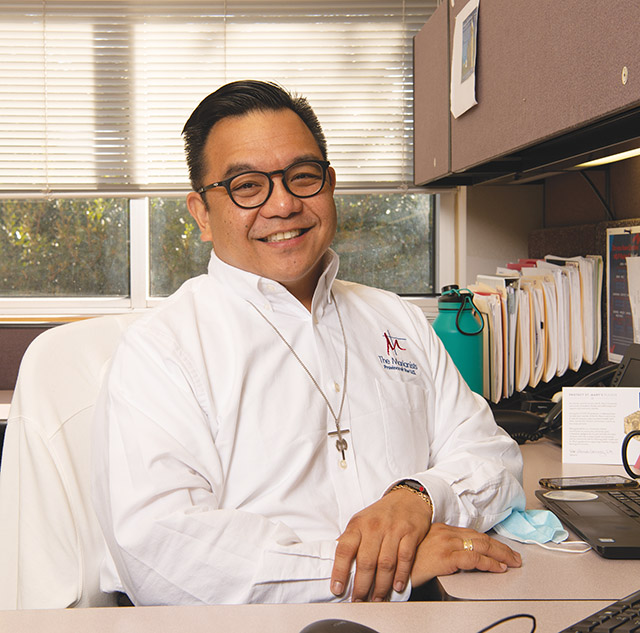
Everyday life as a family
I took the leap of joining the Marianists in 2012 as an aspirant, then in 2013 as a novice or “brother in training.” I learned that living among brothers from different cultures and generations is fun but very challenging and frustrating at times. I might take a glass from the cupboard and find myself saying: Come on friends, we all have a different understanding of how clean something is, but do you actually think this glass is CLEAN!? Even through rough situations and conflict, when you care for your brothers and your life brings you joy, there is a grace in community that is truly priceless.
We come together in fraternal support, encouragement, and prayer and say, “We are a community.” I am truly blessed, humbled, and happy in the life that God has called me to—one where I have been able to serve as a parish pastoral associate, a campus minister, a youth minister, and more. Whatever my ministry is, most of all, I am simply a brother.
Related articles: VocationNetwork.org, “What does it mean to be a brother?” and “Brothers: Keepers of the faith.”
Tags
Related
- A call to let go: Profile of Brother Christopher Campos Erran, O.S.C.
- God had a plan for me
- He blends new tech and old prayer: Profile of Brother Joseph Anoop, F.S.P.
- From physics lab to friary—and back again
- Better together: Profile of Brother David Relstab, O.S.A.
- The secret’s out: Brotherhood is powerful
- Brothers win the race: Profile of Brother Rafael Vargas, S.D.B.
- God called me to be a brother
- Modern “prodigal son” meets the brothers: Profile of Brother Ray Morris, B.H.
- Big Brother is watching you Read More
Most Viewed
- Find your spirituality type quiz
- Questions and answers about religious vocations
- Celibacy quiz: Could I be a nun? Could I be a brother? Could I be a priest?
- Resources for older discerners or those with physical and developmental differences
- About Vocation Network and VISION Guide


